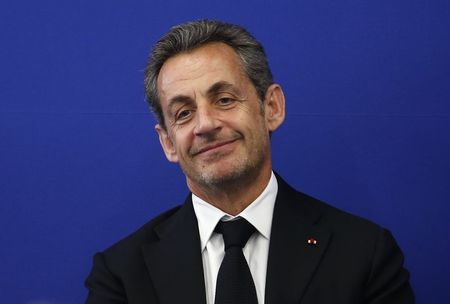By Alexandria Sage
PARIS (Reuters) - It was vintage Nicolas Sarkozy: offering to restore France's battered world standing in a comeback announcement filled with drama and brusque energy that delights some French and repels others.
Pledging to reshape French politics for the 21st century and overcome internal divisions in a country acutely aware of having lost its past grandeur, the 59-year-old conservative set the wheels in motion for a contentious return to politics.
"It would be a form of neglect to remain a spectator in the situation France finds itself in," he wrote on his Facebook page, pledging to revamp the opposition UMP party to appeal to all "those who cannot accept the debasement of France."
The comeback declaration echoed the big ideas and bold pronouncements that propelled him into the presidency in 2007 -- and five years that would be dominated by the 2008/2009 economic crisis and its aftermath rather than a transformation of France.
The hyperactive Sarkozy burst onto the world stage as a reformer full of ideas who would break with France's stagnant past on the domestic front and restore the birthplace of human rights to a place of prominence in international affairs.
The American-style energy and aggressive manner displayed by the former two-time interior minister both attracted and alienated voters as he pledged to shake up the country's labour markets and tax system to bolster industry and job creation.
In the flagship reform of his term, Sarkozy defied hundreds of thousands of strikers to raise the retirement age to 62 from 60, calling the deeply unpopular move his "duty" given the state pension system was insolvent.
That reform earned him the moniker of the Gallic Thatcher as he undertook a series of market-driven reforms such as loosening the 35-hour work week and tweaking the tax system to encourage overtime, casting himself as a problem-solver and man of action.
Brokering a ceasefire to the 2008 Russia-Georgia war, championing a 2011 military intervention in Libya and hosting high-profile G8 and G20 summits the same year won Sarkozy plaudits on the world stage even as discontent mounted at home.
"BLING-BLING"
Sarkozy had vowed on the campaign trail to be a president for all the French people. But a perception that he was on the side of the rich earned him the nickname "President Bling-Bling" and won little credit with voters suffering economic hardship.
A 2010 probe into campaign funding improprieties during his presidential campaign - from which Sarkozy was cleared late last year - was the first of a series of legal headaches for the ex-president, who lost his judicial immunity after leaving office.
Most recently, Sarkozy - who has denied wrongdoing in all of the cases against him - was placed under formal investigation in July on suspicion of trying to influence magistrates examining his 2007 election campaign finances.
While in office, Sarkozy's tough-on-crime attitude, zero tolerance for illegal immigrants and fraught relationship with inhabitants of the immigrant-heavy neighbourhoods around French cities appealed to those on the right, but made him deeply unpopular among many on the Left.
As interior minister, he once referred to rioting youth in the suburbs as "scum", threatening to "clear them out" with high-powered water hoses.
Many French were also rubbed the wrong way by Sarkozy as a person. His fidgety manner, taste for Rolex watches and thirst for the limelight did not sit well with those who saw him as an undignified successor to more discreet presidents of the past.
Many remember with distaste how he celebrated his 2007 election victory with millionaire friends at a swanky Paris nightspot and then vacationed on a yacht.
He blurred the sacrosanct lines among French politicians between public and private life when his second marriage broke apart weeks after taking office and he embarked on a whirlwind courtship of ex-model Carla Bruni, whom he married in 2008.
By May 2012, on the eve of the presidential election, Sarkozy was the least popular head of state in the history of France's Fifth Republic to seek a second term, with two-thirds of voters giving him the thumbs down.
Despite his personal unpopularity, his detractors considered his biggest failure to be that he oversaw a surge in jobless claims, a legacy now ensnaring his successor, Socialist leader Francois Hollande.
Sarkozy blamed the ever-widening deficit on the 2008 financial meltdown, saying things would have been worse without his leadership during the euro zone crisis.
The former president remains a divisive figure today, with 72 percent of supporters of his UMP party having a good opinion of him, but with 65 percent of all French voters unfavourable to a comeback, according to a Sept. 3 BFM poll.

"I know the difficulties that await us," Sarkozy wrote on Friday. "But the stakes are so high, the prospect so exhilarating, the recovery so necessary that to my eyes the obstacles appear paltry."
(Editing by Mark John and Crispian Balmer)
